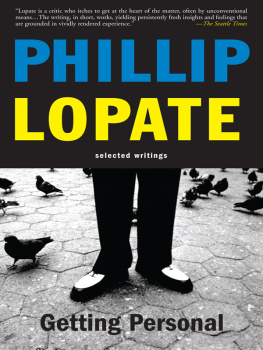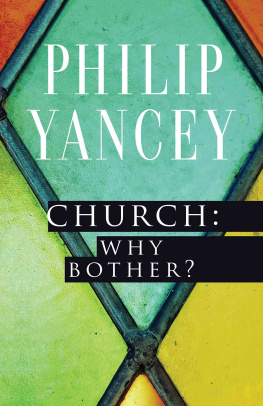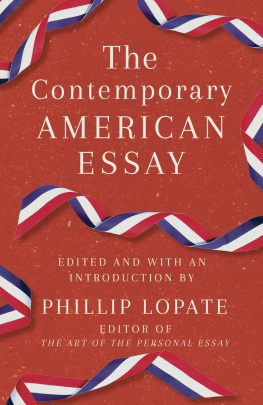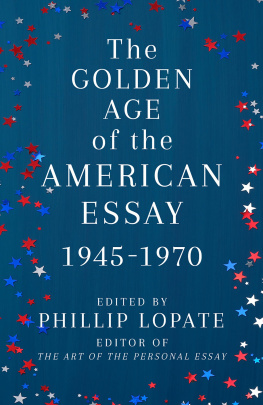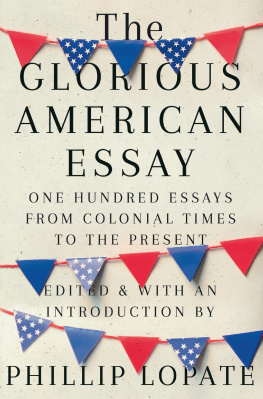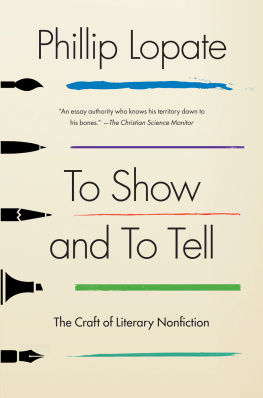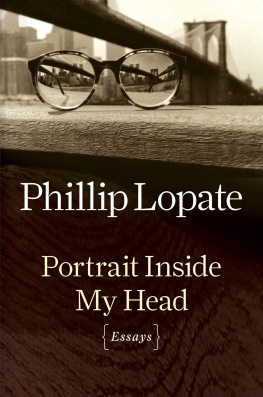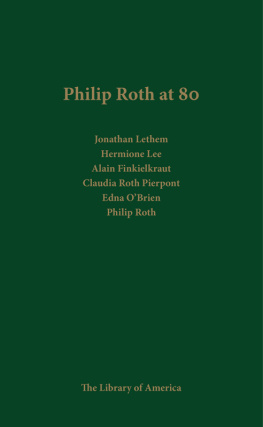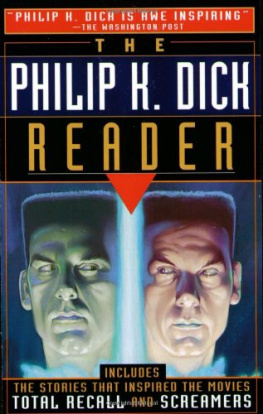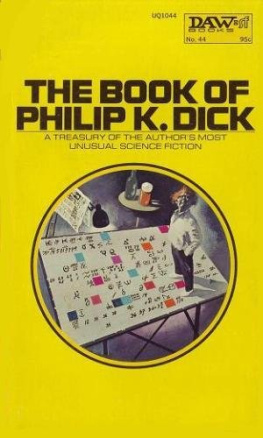Philip Lopate - Getting Personal
Here you can read online Philip Lopate - Getting Personal full text of the book (entire story) in english for free. Download pdf and epub, get meaning, cover and reviews about this ebook. year: 2011, publisher: Basic Books, genre: Art. Description of the work, (preface) as well as reviews are available. Best literature library LitArk.com created for fans of good reading and offers a wide selection of genres:
Romance novel
Science fiction
Adventure
Detective
Science
History
Home and family
Prose
Art
Politics
Computer
Non-fiction
Religion
Business
Children
Humor
Choose a favorite category and find really read worthwhile books. Enjoy immersion in the world of imagination, feel the emotions of the characters or learn something new for yourself, make an fascinating discovery.
- Book:Getting Personal
- Author:
- Publisher:Basic Books
- Genre:
- Year:2011
- Rating:5 / 5
- Favourites:Add to favourites
- Your mark:
- 100
- 1
- 2
- 3
- 4
- 5
Getting Personal: summary, description and annotation
We offer to read an annotation, description, summary or preface (depends on what the author of the book "Getting Personal" wrote himself). If you haven't found the necessary information about the book — write in the comments, we will try to find it.
Getting Personal — read online for free the complete book (whole text) full work
Below is the text of the book, divided by pages. System saving the place of the last page read, allows you to conveniently read the book "Getting Personal" online for free, without having to search again every time where you left off. Put a bookmark, and you can go to the page where you finished reading at any time.
Font size:
Interval:
Bookmark:

ALSO BY PHILLIP LOPATE
- Essays and Non-Fiction
- Waterfront
- Totally, Tenderly, Tragically
- Portrait of My Body
- The Art of the Personal Essay (editor)
- Against Joie de Vivre
- Bachelorhood: Tales of the Metropolis
- Being with Children
- Novels
- The Rug Merchant
- Confessions of Summer
- Poetry
- The Eyes Dont Always Want to Stay Open
- The Daily Round
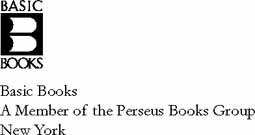
Copyright 2003 by Phillip Lopate
All rights reserved. Printed in the United States of America. No part of this book may be reproduced in any manner whatsoever without written permission except in the case of brief quotations embodied in critical articles and reviews. For information, address Basic Books, 387 Park Avenue South, New York, NY 10016.
Introduction, from THE ART OF THE PERSONAL ESSAY by Phillip Lopate, copyright 1994 by Phillip Lopate. Used by permission of Doubleday, a division of Random House, Inc.
Resistance to the Holocaust (first appeared in TESTIMONY: Contemporary Writers Make the Holocaust Personal, edited by David Rosenberg, Times Books, 1989), The Movies and Spiritual Life (first appeared in THE MOVIE THAT CHANGED MY LIFE, edited by David Rosenberg, Viking, 1991), Detachment and Passion (first appeared in Southwest Review), Confessions of a Shusher, Portrait of My Body (first appeared in Michigan Quarterly Review), The Moody Traveler (first appeared in The New York Times), The Dead Father: A Remembrance of Donald Barthelme (first appeared in The Threepenny Review), and The Story of My Father, from PORTRAIT OF MY BODY by Phillip Lopate, Copyright 1996 by Phillip Lopate. Used by permission of Doubleday, a division of Random House, Inc.
Contempt: Story of a Marriage, from TOTALLY, TENDERLY, TRAGICALLY by Phillip Lopate, copyright 1998 by Phillip Lopate. Used by permission of Doubleday, a division of Random House, Inc.
Books published by Basic Books are available at special discounts for bulk purchases in the United States by corporations, institutions, and other organizations. For more information, please contact the Special Markets Department at the Perseus Books Group, 11 Cambridge Center, Cambridge MA 02142, or call (617) 252-5298, (800) 255-1514 or e-mail .
Designed by Jeff Williams
Set in 10.5-point Garamond MT by the Perseus Books Group
Library of Congress Cataloging-in-Publication Data
Lopate, Phillip, 1943
Getting personal : selected writings / by Phillip Lopate.
p. cm.
Includes bibliographical references.
ISBN 0-465-04173-6 (hc.); 0-465-04174-4 (pbk.)
I. Title.
PS3562.O66A6 2003
818'.5409--dc21
2003013695
To my wife Cheryl and my daughter Lily, always
I HAVE ALWAYS BEEN ATTRACTED TO the confessional mode in literature and, with it, the whole dynamic of confidingness, rationalization, unreliable narration, and self-aggrandizement versus self-disgust. An irresistible title when I was an undergraduate (and a favorite novel of our set) was James Hoggs The Private Memoirs and Confessions of a Justified Sinner. I ate up Dostoevskys Notes From Underground, Gides The Immoralist and his autobiographical writings, The Confessions of St.Augustine, Rousseaus Confessions, Svevos Confessions of Zeno, De Quinceys Confessionsof an English Opium-Eater, Celine, Henry Miller, Kerouac.... I eagerly read the work of the so-called confessional poets, such as Ann Sexton, John Berryman, Sylvia Plath and Robert Lowell, and disagreed with their detractors when they found something unclean about their self-revealing poems, just as, more recently, I could not agree with the backlash against the memoir by critics who felt it was too narcissistically self-indulgent. My own view is that, if anything, what is wrong with most memoirs and autobiographical poems is that they dont go far enough in their confessions; they myopically fudge the details, the close nitty-gritty of self-observation. I am endlessly interested in the wormy thoughts and regrets and excuses and explanations that people have for their behavior. Confessional is, to me, a descriptive term, not a derogatory one. (My first novel was called Confessions of Summer.) It was inevitable that I should be drawn to the personal essay, the form with which I am now most identified, because of its conversational and confessional attributes.
Honesty has been, for me, the one lodestar to which I never stop aspiring in print. I dont say I attain honesty, but the very fact that I try to reach it gives my work, at least in my own eyes, a formal thrust, a dynamic, a topography. I want to get to the bottom of things. And as a reader, I have always loved that moment when the writer said something very daring, tore the cover off, told the real truth, and you had to gasp. Of course it is necessary to do more than merely confess and strive for honesty. (What, I wonder? Expanded argument tk.)
I have sometimes been startled to hear a stranger, acquaintance, or even friend make some indulgent comment about me that seems drawn from assumptions about my character as it has appeared in print. For instance, they might say, Oh, you wouldnt like to go on a nature hike, when in fact I am very susceptible to the charms of nature. I am not a committed curmudgeon, by any means. The contrarian role I have sometimes assumed in print, to throw my I-character into sharper relief or to distance myself from conventional thinking, has become a mental reflex, one part of my thinking pattern. But in daily circumstances, I am energetic and almost lifeembracing; I regard myself as a blend of optimist and stoic. True, I like a little complexity and darkness with my optimism, though only in a Pollyannaish culture such as Americas would such seasonings be regarded as cynical. (This is beginning to sound smug.)
My prose style drifts in and out of beauty. I am not one of those to break himself on the wheel of the sentence. I do not try, as Isaac Babel did, to unleash a period with the force of a bullet; I simply end a sentence and start another. I sometimes listen in amazement to the advice other writing teachers give their students, such as: You should purge your work of passive verbs or adjectives. I would never think of doing such a thing to my own prose. Where my writing is lively (theres that is againshould I change it to something more active?), its because what I have to say at that moment quickens into vigorous expression. A writer-friend told me she never begins a sentence with a gerund. Having started many such sentences this way myself, I paid her no heed; besides, archaic diction has always had a perverse appeal for me. I have never set out to exemplify the most up-to-date prose. I expect to be clear, and thats about it. It surprises and delights me when I come across a passage I wrote years ago that has a measure of elegance, concision, density of thought. Knowing you can write well sometimes, the reader might ask, why dont you make the effort to do it always? I dont know. It goes against the grain to take myself or the art of prose so seriously; Flauberts
Font size:
Interval:
Bookmark:
Similar books «Getting Personal»
Look at similar books to Getting Personal. We have selected literature similar in name and meaning in the hope of providing readers with more options to find new, interesting, not yet read works.
Discussion, reviews of the book Getting Personal and just readers' own opinions. Leave your comments, write what you think about the work, its meaning or the main characters. Specify what exactly you liked and what you didn't like, and why you think so.

